|
|
|
Sort Order |
|
|
|
Items / Page
|
|
|
|
|
|
|
| Srl | Item |
| 1 |
ID:
083244
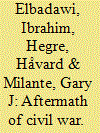

|
|
|
|
|
| Publication |
2008.
|
| Summary/Abstract |
This article introduces the special issue on `The Aftermath of Civil War' and presents the research project from which the articles in this issue originate. The article presents a few empirical observations that demonstrate the increasing importance of the post-conflict situation for actors that engage to reduce the global incidence of armed conflict. The global incidence of conflict was reduced from 1992 to 2002, since there were more terminations than onsets. Although this trend seems to have halted, a scrutiny of the onsets shows that they increasingly are recurrences of conflicts that have been inactive for a period. In 2005 and 2006, there were no new conflicts. The article then briefly introduces the six contributions to the special issue. The articles investigate the importance of peacekeeping troops, elections, aid, capital flight, and exclusion of parties from peace agreements in post-conflict situations. The articles are also applicable to countries that have not had armed conflicts, as the authors investigate the relationship between ethnic diversity and military spending and the determinants of youths' decisions to participate in rebel groups.
|
|
|
|
|
|
|
|
|
|
|
|
|
|
|
|
| 2 |
ID:
133430


|
|
|
|
|
| Publication |
2014.
|
| Summary/Abstract |
This paper analyses anti-corruption efforts in post-conflict Liberia. It highlights citizens' views on the definition of corruption and argues that, in the past, anti-corruption efforts have often focused on institution building and formal justice mechanisms without sufficient understanding of accountability dynamics on the ground. Anti-corruption approaches in Liberia have only nominally examined whether there is a shared understanding of what 'corruption' is and why it is regarded as a problem. The paper examines the social norms and perceptions that underlie understandings of the term corruption. It argues that the international community may have overlooked the fact that 'corruption' has become an all-encompassing term that masks a myriad of differing priorities and concerns. The authors posit that 'accountability' may be a more useful lens for those actors hoping to improve governance in these contexts.
|
|
|
|
|
|
|
|
|
|
|
|
|
|
|
|
| 3 |
ID:
078981
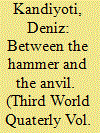

|
|
|
|
|
| Publication |
2007.
|
| Summary/Abstract |
This paper argues that gender issues are becoming politicised in novel and counterproductive ways in contexts where armed interventions usher in new blueprints for governance and 'democratisation'. Using illustrations from constitutional and electoral processes in Afghanistan and Iraq, it analyses how the nature of emerging political settlements in environments of high risk and insecurity may jeopardise stated international commitments to a women's rights agenda. The disjuncture between stated aims and observed outcomes becomes particularly acute in contexts where security and the rule of law are severely compromised, where Islam becomes a stake in power struggles among contending factions and where ethnic/sectarian constituencies are locked in struggles of representation in defence of their collective rights.
|
|
|
|
|
|
|
|
|
|
|
|
|
|
|
|
| 4 |
ID:
180644
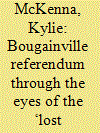

|
|
|
|
|
| Summary/Abstract |
A referendum to decide on Bougainville's future political relationship with Papua New Guinea was held in November 2019. The deferred, non-binding, referendum is a key milestone contained in the Bougainville Peace Agreement (BPA), which sought to reconcile a violent conflict from 1988 to 1998. Although the Bougainville peace process has been deemed a success and significant milestones have been reached towards implementation of the BPA, the conflict continues to have enduring impacts. Particular concerns have been raised about Bougainville's large youth population, often referred to as the ‘lost generation’. This paper documents observations of the 2019 referendum from the perspective of four university students born during the conflict in Siwai District, South Bougainville, whom participated officially in the referendum as an observer group. While trauma and a disrupted education have contributed to youth unemployment and substance abuse in Bougainville, the paper offers a stark contrast to negative narratives of young Bougainvilleans as lacking capabilities to contribute to social and political life. As Bougainville embarks on yet another period of political uncertainty, the paper calls for greater attention to finding avenues to support these young voices to ensure that their generation is not ‘lost’ forever.
|
|
|
|
|
|
|
|
|
|
|
|
|
|
|
|
| 5 |
ID:
133432
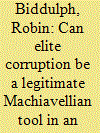

|
|
|
|
|
| Publication |
2014.
|
| Summary/Abstract |
Elite corruption may have a significant role in ending conflicts and shaping post-conflict development. This article enquires into the legitimacy accorded to such corruption. It reviews literature on post-conflict Cambodia, seeking evidence that academic commentaries, public opinion or elites themselves regard elite corruption as a legitimate Machiavellian tool for achieving other ends. Corruption has been an element of the style of government adopted by the dominant party in Cambodia, shaping both the achievement of peace and the uneven economic development that followed. Academic commentaries provide some implicit and explicit legitimation of corruption as a means to secure peace and to resist neoliberal policy settings by affording government discretionary resources and power. Meanwhile, public dissatisfaction with elite corruption appears to the most likely source of renewed violent conflict in Cambodia. How elite actors rationalise and legitimise corrupt behaviour remains poorly understood, and is deserving of more attention.
|
|
|
|
|
|
|
|
|
|
|
|
|
|
|
|
| 6 |
ID:
134295
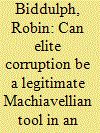

|
|
|
|
|
| Summary/Abstract |
Elite corruption may have a significant role in ending conflicts and shaping post-conflict development. This article enquires into the legitimacy accorded to such corruption. It reviews literature on post-conflict Cambodia, seeking evidence that academic commentaries, public opinion or elites themselves regard elite corruption as a legitimate Machiavellian tool for achieving other ends. Corruption has been an element of the style of government adopted by the dominant party in Cambodia, shaping both the achievement of peace and the uneven economic development that followed. Academic commentaries provide some implicit and explicit legitimation of corruption as a means to secure peace and to resist neoliberal policy settings by affording government discretionary resources and power. Meanwhile, public dissatisfaction with elite corruption appears to the most likely source of renewed violent conflict in Cambodia. How elite actors rationalise and legitimise corrupt behaviour remains poorly understood, and is deserving of more attention.
|
|
|
|
|
|
|
|
|
|
|
|
|
|
|
|
| 7 |
ID:
086199
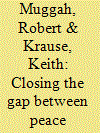

|
|
|
|
|
| Publication |
2009.
|
| Summary/Abstract |
This article highlights how the instruments for addressing the presumed source(s) of armed violence need to be sharpened and extended to address the heterogeneous character of armed violence present in many post-conflict situations. These extensions require the development of practical armed violence prevention and reduction programmes that draw upon scholarship and practice from the criminal justice and public health sectors. The article argues that reducing organized violence and insecurity in post-conflict contexts requires responding to the wider dynamics of armed violence rather than focusing exclusively on insecurity directly connected to what are traditionally defined as armed conflict and post-conflict dynamics; and this requires attention not just to the instruments of violence, but also to the political and economic motives of agents and institutions implicated in violent exchanges at all levels of social interaction.
|
|
|
|
|
|
|
|
|
|
|
|
|
|
|
|
| 8 |
ID:
082227
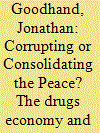

|
|
|
|
|
| Publication |
2008.
|
| Summary/Abstract |
This article examines how the drugs economy emerged, evolved and adapted to transformations in Afghanistan's political economy. With a primary focus on the conflictual war to peace transition following the signing of the Bonn Agreement, the relationship between drugs and political (dis)order is explored. Central to the analysis is an examination of the power relationships and institutions of extraction that developed around the drug economy. Expanding upon a model developed by Snyder (2004), it is argued that joint extraction regimes involving rulers and private actors have tended to bring political order whereas private extraction regimes have led to decentralized violence and political breakdown. This model helps explain why in some parts of Afghanistan drugs and corruption have contributed to a level of political order, whereas in other areas they have fuelled disorder. Thus, there is no universal, one-directional relationship between drugs, corruption and conflict. Peacebuilding involves complex bargaining processes between rulers and peripheral elites over power and resources and when successful leads to stable interdependencies. Counter-narcotics policies have the opposite effect and are thus fuelling conflict
|
|
|
|
|
|
|
|
|
|
|
|
|
|
|
|
| 9 |
ID:
082223
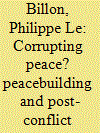

|
|
|
|
|
| Publication |
2008.
|
| Summary/Abstract |
Many conflict-affected countries are among the most corrupt in the world, and corruption is frequently reported as a major concern of local populations and foreign aid agencies during transition to peace. Tackling corruption is part of 'liberal peacebuilding', which seeks to consolidate peace through democracy and free markets economy. Yet liberalization policies may also foster corruption. Using a preliminary analysis of selected corruption perception indicators, this article finds tenuous and divergent support for post-conflict patterns of corruption. Three main arguments linking liberal peacebuilding with higher levels of corruption are then presented for further elaboration, and a research agenda is outlined
|
|
|
|
|
|
|
|
|
|
|
|
|
|
|
|
| 10 |
ID:
128982
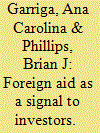

|
|
|
|
|
| Publication |
2014.
|
| Summary/Abstract |
Does development aid attract foreign direct investment (FDI) in post-conflict countries? This article contributes to the growing literature on effects of aid and on determinants of FDI by explaining how development aid in low-information environments is a signal that can attract investment. Before investing abroad, firms seek data on potential host countries. In post-conflict countries, reliable information is poor, in part because governments face unusual incentives to misrepresent information. In these conditions, firms look to signals. One is development aid, because donors tend to give more to countries they trust to properly handle the funds. Our results show that aid seems to draw FDI-however, this is conditional on whether the aid can be considered geostrategically motivated. We also show that this effect decreases as time elapses after the conflict. This suggests that aid's signaling effect is specific to low-information environments, and helps rule out alternative causal mechanisms linking aid and FDI.
aid
|
|
|
|
|
|
|
|
|
|
|
|
|
|
|
|
| 11 |
ID:
066972
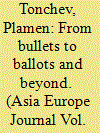

|
|
|
| 12 |
ID:
181641
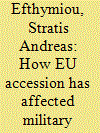

|
|
|
|
|
| Summary/Abstract |
This article explores how the concept of military service develops in the post-conflict society of Cyprus (RoC), following its accession to the European Union (EU). It is based on an exhaustive series of individual interviews with soldiers, lawyers, politicians, ambassadors and civilians, as well as an analysis of media content. The article sets out exactly how EU accession presented a confusing ideological trajectory for the army, lowering motivation for defending the border against occupying forces. The diminishing value of military service takes place against a background of changing masculine ideals. Moreover, defence diplomacy aiming to create energy alliances between EU member states against Turkey had the unintended consequence of young men further disassociating from direct involvement in the defence project. The article also analyses a number of policies developed to deal with conscription issues. Through the case study of Cyprus, we come to see how policy on military service during the EU accession process should incorporate changing civil-military relations.
|
|
|
|
|
|
|
|
|
|
|
|
|
|
|
|
| 13 |
ID:
114539
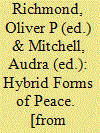

|
|
|
|
|
| Publication |
United Kingdom, Palgrave Macmillan, 2012.
|
| Description |
x, 311p.Hbk
|
| Series |
Rethinking Peace and Conflict Studies
|
| Standard Number |
9780230282285
|
|
|
|
|
|
|
|
|
|
|
|
Copies: C:1/I:0,R:0,Q:0
Circulation
| Accession# | Call# | Current Location | Status | Policy | Location |
| 056793 | 327.172/RIC 056793 | Main | On Shelf | General | |
|
|
|
|
| 14 |
ID:
185078


|
|
|
|
|
| Summary/Abstract |
The US and UN are two of the largest patrons of police reform programs worldwide: between 2000 and 2020, the US provided approximately $160 billion in police assistance to more than 130 countries worldwide; simultaneously, the UN spent over $77 billion supplying police-oriented security sector reform to countries experiencing or having experienced armed conflict, doing so through the deployment of peacekeeping missions and within the offices of UN Police, the UN’s hub for police reform and training programs. Though these two providers seek the same overall objective, they often vary in their specific goals: the US often engages in foreign police reform to promote its own national security objectives by increasing institutional capacity, while the UN adopts police reform programs to promote institutional constraint. The two models have important implications for how we understand bilateral and multilateral reform programs, including activities performed and recipient countries targeted across both time and space. Using originally collected data on US security assistance programs as well as a careful analysis of original data on UN mandates, this article provides the first quantitative exploration of these two different modes of assistance, comparing and contrasting their objectives and where, when, and how they are provided.
|
|
|
|
|
|
|
|
|
|
|
|
|
|
|
|
| 15 |
ID:
161742
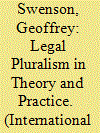

|
|
|
|
|
| Summary/Abstract |
Legal pluralism has vast policy and governance implications. In developing countries, for instance, non-state justice systems often handle most disputes and retain substantial autonomy and authority. Legal pluralism's importance, however, is rarely recognized and dramatically under theorized. This article advances scholarly understanding of legal pluralism both theoretically and empirically. It proposes a new typological framework for conceptualizing legal pluralism through four distinct archetypes – combative, competitive, cooperative, and complementary – to help clarify the range of relationships between state and non-state actors. It posits five main strategies used by domestic and international actors in attempts to influence the relationship between state and non-state justice systems: bridging, harmonization, incorporation, subsidization, and repression. As post-conflict situations are fluid and can feature a wide range of relationships between state and non-state actors, they are particularly instructive for showing how legal pluralism archetypes can be shifted over time. Case studies from Timor-Leste and Afghanistan highlight that selecting an appropriate policy is vital for achieving sustainable positive outcomes. Strategies that rely on large scale spending or even the use of substantial military force in isolation are unlikely to be successful. The most promising approaches are culturally intelligible and constructively engage non-state justice networks of authority and legitimacy to collectively advance the judicial state-building process. While the case studies focus on post-conflict states, the theory presented can help understand and improve efforts to promote the rule of law as well as good governance and development more broadly in all legally pluralist settings.
|
|
|
|
|
|
|
|
|
|
|
|
|
|
|
|
| 16 |
ID:
056716
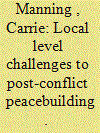

|
|
|
| 17 |
ID:
169004
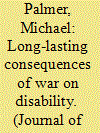

|
|
|
|
|
| Summary/Abstract |
This article investigates the impact of exposure to United States air force bombing during 1965–75 on the disability status of individuals in Vietnam in 2009. Using a combination of national census and US military data and an instrumental variable strategy which exploits the distance to the former North–South border as a quasi-experiment, the article finds a positive and significant impact of bombing exposure on district level disability rates 40 years after the war. The overall effect of bombing on the long-term disability rate among the Vietnamese population is highest among heavily bombed districts. Districts in the top bombing quintile experience a 25% relative increase in the rate of disability attributable to bombing compared with districts in the lowest bombing quintile. Effects are highest on the prevalence of severe disability and among cohorts before the war’s end. A smaller, yet significant, effect is found among cohorts born after the war. The article finds further evidence of indirect channels through which bombing may have impacted on long-term disability including adverse effects on nutritional environment and human capital attainment. These findings add to the evidence from Vietnam and indicate that wars inflict costs on the health of human populations that last longer than those relating to economic growth and welfare.
|
|
|
|
|
|
|
|
|
|
|
|
|
|
|
|
| 18 |
ID:
161344
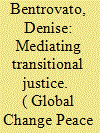

|
|
|
|
|
| Summary/Abstract |
Transitional justice (TJ) and education have recently evolved into key areas of concern in processes of recovery undergone by societies emerging from violent conflict. Referencing the particular case of post-apartheid South Africa, this article investigates the distinct role of school textbooks as mediators of TJ in order to shed light on the under-researched interconnections between these fields. Its analysis of how South Africa’s history textbooks engage with the work of the Truth and Reconciliation Commission explores the discursive and pedagogical strategies they adopt as they deal with this high-profile TJ mechanism. The article’s theorisation will consider textbooks’ possible dual function as both instruments and indicators of broader post-conflict transformation by assessing the possibilities offered by a pedagogical model of TJ education involving history textbooks as ‘heteroglossic spaces’ and as ‘mediators of multivocal discourses’.
|
|
|
|
|
|
|
|
|
|
|
|
|
|
|
|
| 19 |
ID:
157715
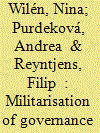

|
|
|
|
|
| Summary/Abstract |
In this article, we develop and expand the rebel-to-ruler literature to go beyond ‘rebel transformations’, in order to examine the transformation and militarisation of the entire post-genocide society in Rwanda. Through a historical and socio-political analysis of the military’s influence in post-genocide Rwanda, we argue that the adoption of military norms and ethos, drawn from an idealised and reconstructed pre-colonial history rather than simply an insurgent past, motivates the military’s centrality and penetration of all society’s sectors, economically, politically and socially, with the ultimate aim of retaining power in the hands of the rebels turned rulers. As such, the case demonstrates the need for an expansion of the rebel-to-ruler literature (1) beyond its concern with parties and regime type to a broader palette of governance effects and (2) beyond its singular focus on insurgent past and towards a longue-durée understanding of complementary causes
|
|
|
|
|
|
|
|
|
|
|
|
|
|
|
|
| 20 |
ID:
103838
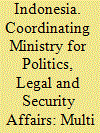

|
|
|
|
|
| Publication |
Jakarta, BRA Bappenas, 2009.
|
| Description |
xxxiv, 193p.
|
|
|
|
|
|
|
|
|
|
|
|
Copies: C:1/I:0,R:0,Q:0
Circulation
| Accession# | Call# | Current Location | Status | Policy | Location |
| 055894 | 327.172/IND 055894 | Main | On Shelf | General | |
|
|
|
|
|
|
|
|
|